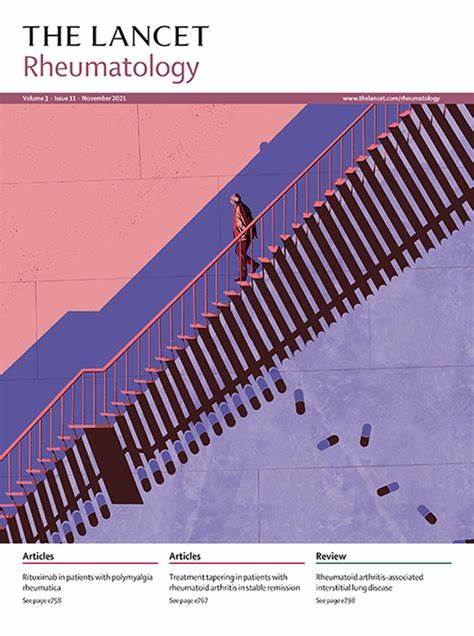Local immune effector cell-associated toxicity syndrome in CAR T-cell treated patients with autoimmune disease: an observational study
IF 16.4
1区 医学
Q1 RHEUMATOLOGY
引用次数: 0
Abstract
Background
CD19-targeting chimeric antigen receptor (CAR) T-cell therapy has advanced treatment strategies for severe autoimmune diseases such as systemic lupus erythematosus (SLE), systemic sclerosis, and idiopathic inflammatory myopathy. Data regarding side-effects are mostly generated from patients with malignancies, but little is known about autoimmune disease-specific adverse events. This study aimed to describe autoimmune disease-specific adverse events that occur with CAR T-cell therapy.
Methods
In this observational study, patients of any age with autoimmune disease receiving CD19-targeting CAR T-cell therapy in two centres in Germany with a follow-up of at least 30 days were assessed for local organ-specific reactions occurring after CAR T-cell infusion. Observed reactions were documented according to localisation, time of onset, and duration, and were graded for severity (grade 1: spontaneous resolution; grade 2: glucocorticoid treatment due to symptoms lasting >1 week or presence of relevant inner organ involvement; grade 3: prolonged or new hospitalisation; grade 4: intensive care treatment). People with related lived experience were involved in the study design and implementation.
Findings
Between March 1, 2021, and Oct 31, 2024, 39 patients with autoimmune disease were treated with CD19-targeting CAR T cells (20 with SLE, 13 with systemic sclerosis, six with idiopathic inflammatory myopathy). 25 (64%) patients were female and 14 (36%) were male. Median age was 36 years (IQR 22–44). 54 local reactions, which we termed local immune effector cell-associated toxicity syndrome (LICATS), were recorded, affecting 30 (77%) patients with a median time of onset of 10 days (IQR 9–21) from CAR T-cell infusion and a median duration of 11 days (5–14). LICATS exclusively occurred during the B-cell aplasia phase and only involved organs previously affected by the respective autoimmune disease. The most frequently affected organs were the skin (19 [35%] of 54) and the kidneys (12 [22%]). Most cases of LICATS were mild (grade 1: 35 [65%]; grade 2: 16 [30%]). Only three cases were grade 3. All events of LICATS resolved without sequelae.
Interpretation
LICATS is a new form of toxicity in patients with autoimmune disease receiving CD19-targeting CAR T-cell therapy, most likely based on the cleansing of immune cells from the affected organs. It is self-limited, organ-specific, and usually mild in its intensity.
Funding
Deutsche Forschungsgemeinschaft (DFG), German Cancer Aid, Bundesministerium für Bildung und Forschung, European Union, Staedtler Foundation, Lupus Research Alliance, and donations from the Bendel family and the Bleyl family.
CAR - t细胞治疗自身免疫性疾病患者的局部免疫效应细胞相关毒性综合征:一项观察性研究
背景:靶向cd19的嵌合抗原受体(CAR) t细胞疗法在严重自身免疫性疾病,如系统性红斑狼疮(SLE)、系统性硬化症和特发性炎性肌病等方面具有先进的治疗策略。关于副作用的数据大多来自恶性肿瘤患者,但对自身免疫性疾病特异性不良事件知之甚少。本研究旨在描述CAR - t细胞治疗中发生的自身免疫性疾病特异性不良事件。方法:在这项观察性研究中,任何年龄的自身免疫性疾病患者在德国的两个中心接受cd19靶向CAR -t细胞治疗,随访至少30天,评估CAR -t细胞输注后发生的局部器官特异性反应。观察到的反应根据部位、发作时间和持续时间进行记录,并根据严重程度进行分级(1级:自发消退;2级:因症状持续10 ~ 1周或存在相关脏器受累而接受糖皮质激素治疗;3级:长期或新的住院治疗;4级:重症监护治疗)。有相关生活经验的人参与了研究的设计和实施。结果:在2021年3月1日至2024年10月31日期间,39名自身免疫性疾病患者接受了靶向cd19的CAR - T细胞治疗(20名SLE患者,13名系统性硬化症患者,6名特发性炎性肌病患者)。女性25例(64%),男性14例(36%)。中位年龄36岁(IQR 22-44)。我们记录了54例局部反应,我们称之为局部免疫效应细胞相关毒性综合征(LICATS),影响了30例(77%)患者,CAR - t细胞输注后的中位发病时间为10天(IQR 9-21),中位持续时间为11天(5-14)。LICATS仅发生在b细胞发育不全期,且仅累及先前受各自自身免疫性疾病影响的器官。最常受影响的器官是皮肤(54例中19例[35%])和肾脏(12例[22%])。大多数LICATS病例为轻度(1级:35 [65%];等级2:16[30%])。只有3例为3级。LICATS的所有事件均得到解决,无后遗症。解释:LICATS是在接受cd19靶向CAR -t细胞治疗的自身免疫性疾病患者中出现的一种新的毒性形式,很可能是基于从受影响器官中清除免疫细胞。它是自限性的,器官特异性的,通常强度较轻。资助:德意志基金会、德国癌症援助、德国联邦政府建设与发展基金会、欧盟、施泰特勒基金会、狼疮研究联盟,以及Bendel家族和Bleyl家族的捐赠。
本文章由计算机程序翻译,如有差异,请以英文原文为准。
求助全文
约1分钟内获得全文
求助全文
来源期刊

Lancet Rheumatology
RHEUMATOLOGY-
CiteScore
34.70
自引率
3.10%
发文量
279
期刊介绍:
The Lancet Rheumatology, an independent journal, is dedicated to publishing content relevant to rheumatology specialists worldwide. It focuses on studies that advance clinical practice, challenge existing norms, and advocate for changes in health policy. The journal covers clinical research, particularly clinical trials, expert reviews, and thought-provoking commentary on the diagnosis, classification, management, and prevention of rheumatic diseases, including arthritis, musculoskeletal disorders, connective tissue diseases, and immune system disorders. Additionally, it publishes high-quality translational studies supported by robust clinical data, prioritizing those that identify potential new therapeutic targets, advance precision medicine efforts, or directly contribute to future clinical trials.
With its strong clinical orientation, The Lancet Rheumatology serves as an independent voice for the rheumatology community, advocating strongly for the enhancement of patients' lives affected by rheumatic diseases worldwide.
 求助内容:
求助内容: 应助结果提醒方式:
应助结果提醒方式:


